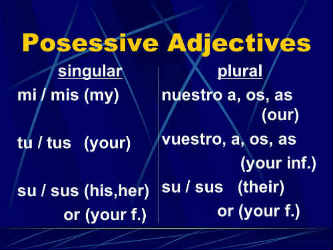In English, the possessive adjectives are: my, your, his, her, our, and their. They indicate ownership. The Spanish possessive adjectives are listed in the table below.
| Singular |
Plural |
|
| mi |
mis |
my |
| tu |
tus |
your (inf) |
| su |
sus |
his/her, your (form) |
| nuestro |
nuestros |
our (m) |
| nuestra |
nuestras |
our (f) |
| vuestro |
vuestros |
your (m) (inf) |
| vuestra |
vuestras |
your (f) (inf) |
| su |
sus |
their, your (form) |
m - masculine
f - feminine
inf - informal, familiar
form - formal
A Possessive Adjective always accompanies a noun.
 mi blusita; mi faldita. - my little blouse; my little skirt
mi blusita; mi faldita. - my little blouse; my little skirt
 nuestras flores - our flowers
nuestras flores - our flowers
 su pelota - his ball
su pelota - his ball
 tu perro - your dog
tu perro - your dog
 mis zapatos - my shoes
mis zapatos - my shoes
 nuestro carro - our car
nuestro carro - our car
 tus gatos - your cats
tus gatos - your cats
 sus libros - their books
sus libros - their books
The Spanish possessive adjective must agree with the number of items a person has.
mi libro - my book
mis libros - my books
The nosotros and vosotros forms change in gender as well;.
There are also the stressed possessive adjectives which go after the noun.
Examples:
 los lapiceros míos - my pens
los lapiceros míos - my pens
 los boletos tuyos - your tickets
los boletos tuyos - your tickets
 las almohadas nuestras - our pillows
las almohadas nuestras - our pillows
Discussing Articles of Clothing and Parts of the Body
Instead of using the possessive adjective (“my”, “your”, etc.) with articles of clothing or parts of the body, Spanish typically uses the definite article and then makes the person involved the indirect object:
¿Te lavaste bien las manos?
Did you wash your hands well?
Me duelen los pies; voy a quitarme los zapatos.
My feet hurt; I'm going to take off my shoes.

Quick Explanation
The possessive adjectives in English are: my, your, his, her, our, their. They show possession. The Spanish possessive adjectives are:
| |
|
|
| mi |
my |
(singular) |
| mis |
my |
(plural) |
| tu |
your |
(singular) |
| tus |
your |
(plural, familiar) |
| su |
his, her |
(singular) |
| sus |
his, her |
(plural) |
| su |
their, your |
(singular) |
| sus |
their, your |
(plural) |
| nuestro(a) |
our |
(singular) |
| nuestros(as) |
our |
(plural) |
| vuestro(a) |
your |
(singular) |
| vuestros(as) |
your |
(plural, familiar) |
Long Explanation
A possessive adjective accompanies a noun.
mi embarque - my shipment
tu beneficio - your benefit
nuestro arreglo - our arrangement
su sinceridad - his, her, their or your sincerity
su padre - his, her, their or your father
sus padres - his, her, their or your parents
sus fondos - his, her, their or your money
The Spanish possessive adjective must agree with the number of items a person has.
mi libro - my book
mis libros - my two books
The nosotros and vosotros forms change in gender as well;.
nuestro libro - our book
nuestra mesa - our desk
nuestras familias - our families
nuestros refrescos - our soft drinks
Possessive adjectives can be divided into two groups: the non-stressed and the stressed forms.
The non-stressed possessives are only used in front of nouns. The forms are:
mi(s) nuestro(s)
tu(s) vuestro(s)
su(s) su(s)
They must agree in number (and in gender for nuestro and vuestro) with the noun, not the person or pronoun to which the refer:
Remember that su(s) is ambiguous; su casa = your [usted] house, his house, her house, its house, your [ustedes] house, their [male and/or female] house.
-
A mi gato no le gustan tus perros.
My cat doesn't like your dogs.
-
Sus caballos arruinaron nuestras flores.
Your [formal] / his / her / their horses ruined our flowers.
The stressed possessives are:
mío nuestro
tuyo vuestro
suyo suyo
They are used after nouns, or can be used with articles as pronouns:
-
Ésa es la casa mía.
That is my house. [Or: That's the house that belongs to me.]
-
Esa casa mía.
That house of mine.
-
Mi casa es más grande que la tuya.
My house is larger than yours.
Note that the forms su and suyo are ambiguous and for clarity or emphasis sake may be replaced by the expressions de usted, de él, de ella, de ustedes, de ellas, and de ellos. For example:
-
La casa de él es roja, pero la de ella es blanca.
His house is red, but hers is white.
-
(Su casa es roja pero la suya es blanca.)
(Virtually meaningless.)
 Icon Legend
Icon Legend Help
Help Download
Download Information
Information


